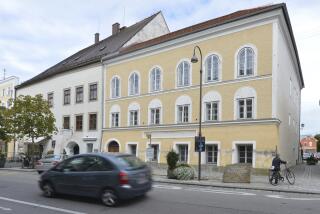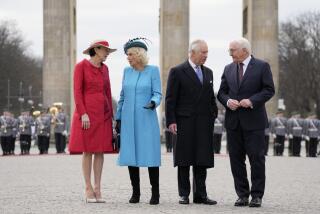Postscript : Coming Home to Rest After 205 Years, 6 Stops : Frederick the Great wanted to be buried in the garden of his summer palace. Now, he’s about to get his wish.
- Share via
POTSDAM, Germany — In his last will and testament, Frederick the Great asked to be buried “quite plainly” in the garden of his Potsdam summer palace, alongside the remains of his beloved greyhounds.
“I have lived as a philosopher, and I want to be buried as such,” he wrote, “without pomp, without ostentation, and without the least ceremony.”
After 205 years and six stopovers, the Prussian king is finally coming home to rest. But the quiet, midnight funeral he demanded is turning into a grand spectacle, fueling an emotional national debate over the proper image for newly united Germany.
The remains of “Old Fritz” and the father he detested, Frederick William (Friedrich Wilhelm) I, are to arrive aboard a restored royal train on Saturday, accompanied by a German army honor guard and serenaded by a military choir. Chancellor Helmut Kohl plans to interrupt his Austrian vacation to attend the ceremony and “pay my respects.”
Spectators are expected to number about 100,000, and German television plans live coverage of the controversial reburials on the grounds of the Sans Souci palace.
The event is the latest in a summer of Sturm und Drang over decisions that conjure ghosts of Germany’s darkest past. From the highest point atop Brandenburg Gate to the depths of the grave being dug at Sans Souci, Germans--and the world--are uneasily confronting Prussia, and questioning, just 43 years after its abolishment, what it really meant.
The debate began in earnest on the cusp of German unification, when Kohl stalled over Poland’s demand that Germany formally recognize its borders. Critics quickly seized this as evidence that German expansionism--a Prussian legacy--had not been snuffed out with Hitler’s defeat in World War II. Kohl eventually acceded to Poland’s request, and the two countries signed a historic friendship treaty in June.
But scarcely a week later, the Prussian monster reared its head again. This time, the Bundestag, or lower house of Parliament, voted by a narrow margin to move the country’s capital from Bonn to Berlin, over the objections of deputies who worried about using the old Prussian--and Nazi--capital to represent democratic Germany.
The crowning blow to Prussiaphobes came last week, when Berlin celebrated the 200th anniversary of the Brandenburg Gate, topped by a restored Prussian eagle and Iron Cross.
And now, with the pomp and circumstance that Frederick the Great himself never wanted, the debate has reached a passionate pitch.
Clergymen, liberal commentators, several conservative historians and left-wing politicians decry the “state funeral” for the father of German militarism, while others, including Kohl, feel such arguments are “irrelevant” in contemporary Germany.
“As with many great historical figures, the light and dark sides of Frederick lie close together,” Kohl said in a statement released from his vacation quarters in Austria recently.
Kohl has said he will attend the reburial as a friend of the house of Hohenzollern, whose 83-year-old head, Prince Louis Ferdinand, invited the chancellor.
According to the German chancellor, Frederick was more than an absolutist monarch who waged war to expand Prussia’s power and territory. “Frederick’s name also invokes the beginnings of a rule by law and modern state administration that pointed the way to the future,” Kohl said. “He made dedication to duty, personal disinterest and efficiency guidelines for state administration . . . His Prussia respected the principle of tolerance and freedom of conscience.”
Frederick the Great came to power in 1740, upon the death of his father, Frederick William I, the “soldier king” who once ordered a friend of his teen-age son’s beheaded for desertion. Frederick, too, had tried to flee to England with the friend, and was forced to watch the execution from his own prison cell. His father then pardoned him.
Despite contempt for his father’s rule, Frederick the Great became one of history’s most brilliant generals, molding Prussia through three wars into Europe’s dominant power. At the same time, though, the Prussian king was seen in the “Age of Enlightenment and Reason” as a liberal force--a musician and philosopher who hosted Voltaire in his court for three years, a despot who nonetheless gave sanctuary to religious refugees and abolished torture.
Although Prussia ceased to be a separate country in 1871, it was the dominant German state until the World War II allies abolished it in 1947, decreeing Prussia was “the purveyor of militarism and reaction from time immemorial.”
When he died on Aug. 17, 1786, Frederick the Great was entombed alongside his father in the Garrison Church of Potsdam. His successor thought it too undignified--despite Frederick’s wishes--to bury the king alongside his dogs.
Six weeks after Adolf Hitler came to power, on March 21, 1933, the Nazi leader celebrated his election in the Garrison Church.
“Hitler wanted to combine the Prussian past and monarchy with the Nazi spirit,” said Juergen Thomas, spokesman for the current mayor of Potsdam.
The martial tradition and ceremony of Prussia soon was associated with the goose-stepping columns of Nazi soldiers. Hitler’s devotion to Prussia was steadfast even in the heat of war. As Allied bombs dropped outside Potsdam in February, 1945, Hitler ordered the bodies of Frederick the Great and his father moved to the Luftwaffe bunker of Hermann Goering.
A few weeks later, they were spirited away to a salt mine in Thuringia, where they were hidden three miles beneath the surface. Six weeks after that, American troops found and seized the sarcophagi. When the Allies then divided Germany into zones of occupation, Thuringia fell to the Soviets, and the Americans moved west, taking the royal remains with them. The kings were given a new funeral at a church in the town of Marburg.
Prince Louis Ferdinand remembers attending the ceremony, and told the Tagesspiegel newspaper in a recent interview that it was that “deeply sad . . . almost macabre ceremony” that persuaded him to one day fulfill the last request of Frederick the Great, and bring him back to Sans Souci.
But Sans Souci was then part of Communist East Germany. In 1952, the prince moved the two Fredericks to the crypt at the Hohenzollern castle in Hechingen, from whence they will begin their final odyssey Aug. 16.
Louis Ferdinand claimed he wanted to fulfill Frederick the Great’s will “to the letter, but in our media age that unfortunately is not entirely possible.”
As criticism of the plans to honor Prussia’s favorite son mounted, the city of Potsdam, the state of Brandenburg, the federal government and the royal household all insisted that one or the other were responsible for the hoopla.
And just who is paying for what also remained unclear, although Louis Ferdinand said his family chartered the special antique train from the federal railroad, and the state of Brandenburg acknowledged that it was hosting a reception for the 200 dignitaries invited to the private ceremony.
But the city is expected to deploy around 1,700 police officers to handle security and crowd control. Officials also are worried that neo-Nazis and skinheads will show up, and critics warn that Sans Souci could become a shrine for the growing number of radicals who embrace the uglier Prussian traditions.
Whether or how the military will be permitted to participate in the ceremony may still be decided by the Administrative Court, which is weighing an injunction filed by a pastor.
Conservative historian Golo Mann cautioned that European neighbors might look dimly upon the glorification of the Prussian king.
“If you want to do that with the help of the chancellor . . . it would demonstrate the kind of mentality that prompts cheers among the stupid but causes awkward fears in European capitals,” Mann wrote in the Cologne Express newspaper.
But Alfred Dregger, chairman of the Christian Democrat/Christian Social Union faction in Parliament, said the whole affair offered a golden opportunity for Germany to examine and debate its history.
“For years, I’ve preached that German history didn’t last 12, but 1,200 years. We must finally free ourselves from the shadows of these deplorable 12 years,” he said on Hessen Radio. “Frederick the Great and his father have nothing to do with this history of 1933 to 1945.”
But perhaps the last word belongs to Frederick himself.
“One should bring me by lamplight, and without anyone following me, to Sans Souci,” he wrote in his will, “and bury me there very simply. . . . “
Name: Frederick II (Nickname: Frederick the Great)
Born: Jan. 24, 1712
Died: Aug. 17, 1786
Title: King of Prussia from 1740 to 1786
Job Description: As absolute ruler of the provincial kingdom of Brandenburg-Prussia Frederick II played a leading role in the breakup of the Holy Roman Empire and the eventual unification of the German states.
Background: Frederick II was born in the provincial capital of Berlin to Frederick William I, King of Prussia and Sophie Dorothea, daughter of George I and sister of George II of England. He was raised from birth to be a soldier, subjected to a Spartan regimen of army drill and a life devoid of “frivolous” comfort.
Military campaigns: Invasion of Silesia, 1740. Only a few months after taking his place on the throne, Frederick II was the first European leader to strike at territorial holdings of the Austrian Empire following the death of Charles II. He gained total control in seven short weeks and despite international protest Silesia became a permanent part of Prussia.
Invasion of Bohemia, 1745. Also known as the Second Silesian War. Soon after what looked like certain defeat, he rallied his troops to victory. The Treaty of Dresden which marked the end of these battles resulted in great renown and at the age of 33 Frederick was to become known as “the Great”
Seven Years War, 1756-1763. Frederick initiated this bloody continental war in the summer of 1756 with the invasion and defeat of Saxony. The victory marked the beginning of Prussia’s leadership toward the unification of the German states.
The Austrian throne was so weakened that it lost its hold on the Holy Roman Empire which eventually fell under pressures from Napoleon in 1806.
Source: Encyclopedia Britanica.
More to Read
Sign up for Essential California
The most important California stories and recommendations in your inbox every morning.
You may occasionally receive promotional content from the Los Angeles Times.










